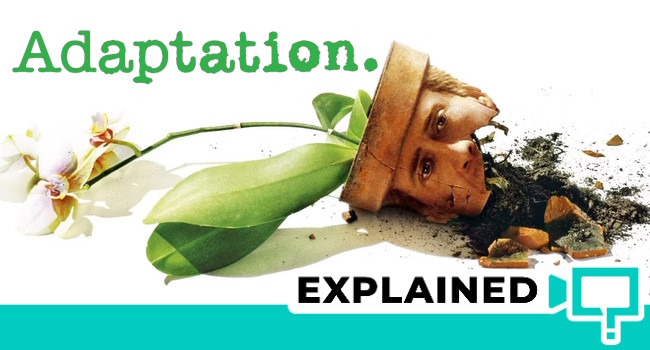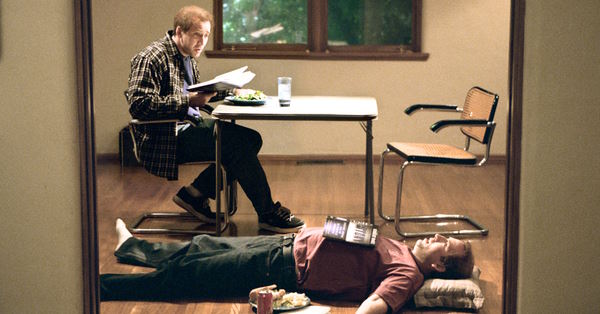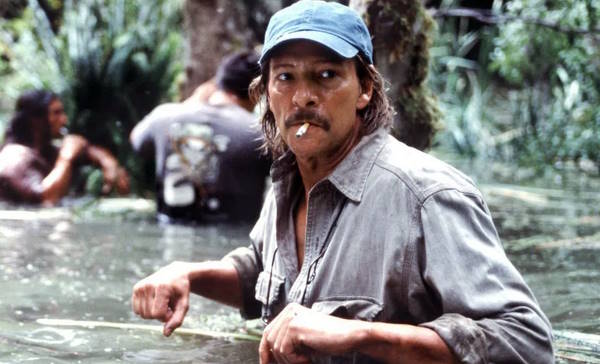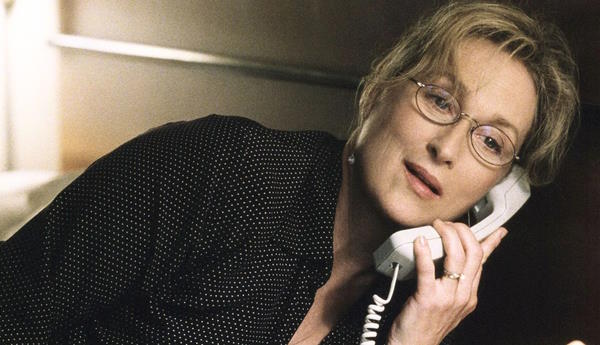Adaptation is a 2002 film directed by Spike Jonze and written by Charlie Kaufman that follows the story of a struggling screenwriter, Charlie Kaufman, trying to adapt a non-fiction book into a feature film. The film is a complex and multi-layered work that challenges traditional narrative structures and explores themes such as creativity, inspiration, identity, and self-discovery. Here’s the plot and ending of the 2002 movie Adaptation explained; spoilers ahead.
Hollywordle – Check out my new Hollywood Wordle game! Where To Watch? To find where to stream any movie or series based on your country, use This Is Barry’s Where To Watch. Oh, and if this article doesn’t answer all of your questions, drop me a comment or an FB chat message, and I’ll get you the answer. You can find other film explanations using the search option on top of the site.
Contents
Here are links to the key aspects of the movie:
- – Movie vs Real Life Explained
- – Characters Explained
- – Charlie Kaufman
- – Donald Kaufman
- – Susan Orlean
- – John Laroche
- – Plot Explained
- – Was Orlean and Laroche’s romantic angle an actual thing?
- – Ending Explained
Adaptation: Movie Vs Real Life Explained
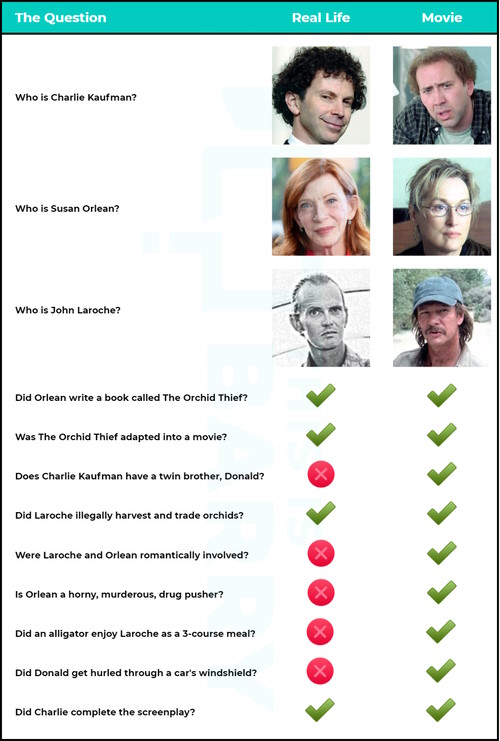
In real life, Charlie Kaufman was tasked with adapting a book called ‘The Orchid Thief’ into a movie. The book was written by Susan Orlean, who wrote about an Orchid Thief named John Laroche. It was a simple non-fiction book that detailed Laroche’s activities related to trading orchids. The real Charlie had writer’s block and struggled to convert this non-fiction book into a movie script.
In real life, the real Laroche’s arrest got the real writer Susan Orleans curious, and she wrote a book about the whole thing. This book, The Orchid Thief, was adapted into a movie called Adaptation, which is about the adaptation of this book into a movie. The real Charlie wrote his screenplay, featuring himself having writer’s block, converting the book into a movie. So…
In the movie Adaptation, Charlie Kaufman is tasked with adapting a book called ‘The Orchid Thief’ into a movie. The book is written by Susan Orlean, who wrote about an Orchid Thief named John Laroche. In the film, Charlie has a twin brother, Donald, and the book fictitiously talks about a romantic relationship Orlean had with Laroche. The film Adaptation purposely spices up the ending to make it intriguing for the commercial film loving audience.
Adaptation Movie: Characters Explained
The Protagonist: Charlie Kaufman
Charlie Kaufman, played by Nicolas Cage, is central character of the film. He is a struggling screenwriter tasked with adapting Susan Orlean’s non-fiction book ‘The Orchid Thief’ into a feature film. Charlie is depicted as a socially awkward introvert struggling to carve his place in the world. Charlie is portrayed as highly introspective and self-critical. He is constantly questioning his own identity and is also depicted as deeply insecure, which is reflected in his lack of confidence in his writing abilities.
Throughout the film, Charlie grapples with his creative struggles and the limitations imposed by the source material. He is torn between his desire to stay true to the spirit of Orlean’s book and his need to make the story appealing to a mainstream audience. Ultimately, Charlie learns to embrace his voice and finds his unique way of telling the story. This is both the story of the movie and what actually happened as the real Charlie Kaufman wrote the screenplay for this film.
The Hyperbole: Donald Kaufman
Donald Kaufman is Charlie’s twin brother. Donald is depicted as being the polar opposite of Charlie in terms of personality. He is confident, outgoing, and optimistic. Donald’s character serves as a foil to Charlie and represents the idea that there are often multiple sides to a person’s identity. Donald’s decision to become a screenwriter and his success in the field are meant to highlight the idea that anyone can thrive if they are willing to embrace their voice and be confident in their abilities. Easier said than done.
When the movie Adaptation was nominated for the Oscars for Best Screenplay, both Charlie and Donald were nominated. Talk about extrapolation!
The Author: Susan Orlean
Orlean, played by Meryl Streep, is the writer of The Orchid Thief, the non-fiction book that Charlie is trying to adapt into a feature film. Orlean is depicted as confident and booming, contrasting with Charlie’s insecurities and lack of confidence.
The Orchid Theif: John Laroche
Laroche, played by Chris Cooper, is the real-life orchid hunter, the subject of Orlean’s book. In the film, Laroche is depicted as a charismatic and confident individual. But it is later disclosed that he is actually a vulnerable and broken person struggling to find meaning in his life. Laroche’s character serves as a metaphor for the idea that there is often a difference between appearance and reality and that what we perceive as ‘real’ is often shaped by our own subjective experiences.
What is the loophole John Laroche uses?
The film is set in the 1990s when many species of orchids were threatened with extinction due to over-collection and habitat destruction. The law imposed restrictions on the trade and cultivation of specific rare orchids to protect these species.
Laroche utilises his relationship with the Seminoles tribe of Native Americans and uses their sovereign status to cultivate and sell plants illegally. Laroche also claims his trade is for scientific purposes but was eventually arrested for illegal poaching.
Adaptation Movie: Plot Explained
Adaptation is a non-linear film that blurs the boundaries between fact and fiction. The film opens with Charlie Kaufman struggling with writer’s block as he tries to adapt Orlean’s book into a feature film.
Charlie’s story is interwoven throughout the film with the story of The Orchid Thief and the events described in Orlean’s book. As Charlie tussles with his own creative struggles, he becomes increasingly fascinated with Laroche’s saga and the orchid hunter’s unique perspective on life.
At the same time, Charlie’s twin brother Donald decides to become a screenwriter, much to Charlie’s dismay. Despite having no previous experience or talent in writing, Donald quickly finds massive success in the industry.
As Charlie continues to toil with his screenplay, he meets Robert McKee, a successful screenwriting guru who conducts screenwriting seminars. Charlie attends one of McKee’s seminars and is inspired by the guru’s teachings. But at the same time, he becomes increasingly frustrated with the limitations imposed by the Hollywood studio system and the commercialism of the film industry.
Charlie requests Donald to impersonate him and interview Orleans, which becomes a tipping point on the crazy-scale in the film. The plot discloses that Orleans is in a romantic relationship with Laroche, who is using the orchid to create a hallucinatory drug. As the two have sex, they catch Charlie listening in on their secret and decide it is best to kill him!
Things go bat-sh*t crazy as it turns into a shoot-out, with Donald being hurled out of the car and killed as Charlie crashes into a truck. Next, we have Laroche eaten alive by an alligator, and finally, Orlean is arrested for her involvement in the criminal activities. The movie ends with Charlie grieving for his brother, finding love and successfully wrapping up the screenplay for the film.
Was Orlean and Laroche’s romantic angle an actual thing?
No, the real-life book The Orchid Thief does not contain a romantic angle between Orlean and John Laroche. The book is a non-fiction work that only tells the story of Laroche’s obsession with rare orchids and his attempts to cultivate and sell them.
The romantic angle between Orlean and Laroche in the film Adaptation is a creative invention of the filmmakers, added as a way to explore the themes of perception and the subjective nature of reality.
Also, to spice things up for the sake of a commercial movie audience, they introduced the hallucinogenic drug, the murder of Donald, the death of Laroche and the arrest of Orlean, who is otherwise a peaceful, docile woman in real life. When the real-world Susan Orlean first read the movie’s script, she was pretty appaled, understandably so, but later warmed up to it.
Adaptation Movie: Ending Explained
The ending of the 2002 movie Adaptation is both surreal and thought-provoking. The film ends with a montage of scenes from Charlie’s screenplay, which are portrayed as if they are actual events. The distinction between reality and fiction becomes hazy, highlighting the idea that creativity has the power to shape reality and that the stories we tell profoundly impact the world around us.
In the final scene, Charlie Kaufman, who has bumbled throughout the film with writer’s block and his own identity, finally writes a screenplay that is true to the spirit of Susan Orlean’s book The Orchid Thief and to his own experiences. And to spice it up for the audience, Charlie erratically adds elements of a crime thriller at the end.
The movie Adaptation is a screenplay within a screenplay – Scriptception, if you will! What were your thoughts on the plot and ending of the movie Adaptation? Do comment below.

Barry is a technologist who helps start-ups build successful products. His love for movies and production has led him to write his well-received film explanation and analysis articles to help everyone appreciate the films better. He’s regularly available for a chat conversation on his website and consults on storyboarding from time to time.
Click to browse all his film articles
